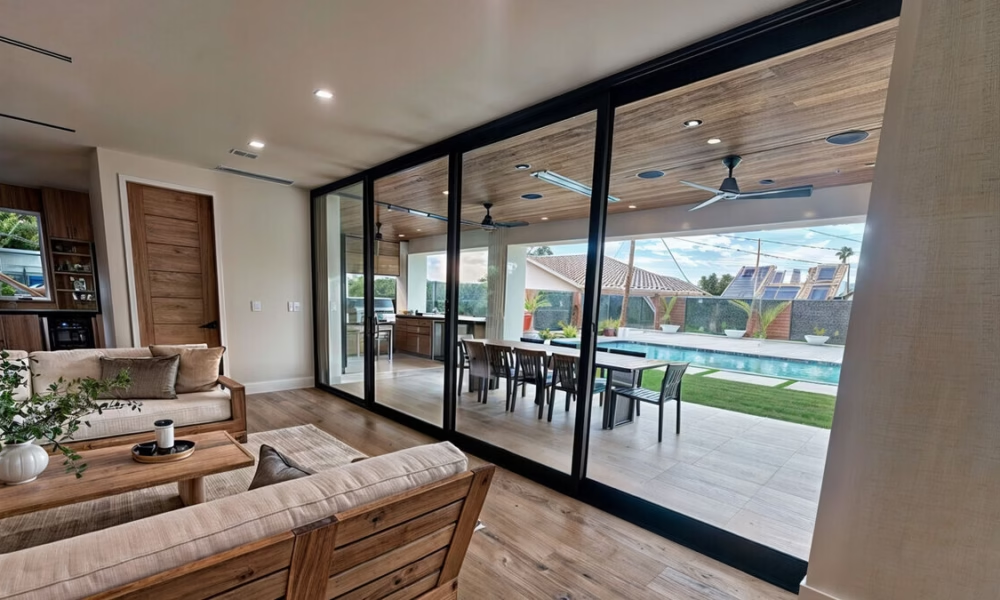Comfort inside a home greatly depends on the performance of windows and doors, as they help maintain a stable temperature and a quiet environment.
In the case of aluminum and glass sliding doors, having proper thermal and acoustic insulation is essential to reduce energy consumption, protect against extreme temperatures, and maintain privacy from outside noise.
Many people think improving insulation means replacing the entire door, but there are different solutions that can optimize its performance without changing the whole system. From choosing the right type of glass to installing seals and weatherstripping, there are alternatives that can significantly increase efficiency and comfort.
Here, we’ll go over the main strategies to improve the insulation of your sliding glass doors, explaining how each works and when it’s best to consult a specialist to ensure professional and long-lasting results.
👉 You may also be interested in reading: Advantages of Using Aluminum Sliding Doors in U.S. Homes

Thermal Insulation in Sliding Doors: The Challenge of Maintaining Ideal Temperatures
One of the main challenges with aluminum sliding doors is preventing heat or cold from transferring between the interior and exterior. To improve thermal performance, there are several solutions:
Thermal Break
Aluminum profiles with a thermal break include an insulating barrier between the interior and exterior faces, reducing heat transfer and improving the home’s energy efficiency.
High-Performance Glass (Low-E and Argon Gas)
Choosing Low-E glass helps control solar radiation and reduce heat gain during summer, while argon gas fills in double-glazed units to increase thermal resistance and prevent heat loss during winter.
Quality Seals and Gaskets
Ensure the door has proper perimeter seals and well-fitted gaskets to prevent air leaks that impact comfort and energy costs.
💡 Tip: If your current door doesn’t have a thermal break, complementary solutions like high-quality weatherstripping and seals can improve insulation without replacing the entire system, but this should be evaluated by a professional such as an architect or contractor.
Acoustic Insulation for Increased Privacy and Sound Control
Beyond temperature control, outside noise can greatly impact the comfort of a home. Improving the acoustic insulation of sliding glass doors is especially important in urban areas, near busy streets, airports, or coastal zones with constant wind.
Here’s what you can apply:
- Laminated Glass with Acoustic Interlayers: Using laminated glass with special sound-dampening interlayers helps significantly reduce outside noise. STC (Sound Transmission Class) and OITC (Outdoor-Indoor Transmission Class) are key indicators to measure a door’s acoustic performance.
- Well-Sealed Frames: Beyond the glass, aluminum frames with quality perimeter seals prevent sound leakage. Proper adjustment between moving and fixed panels is essential to block noise effectively.
- Double or Triple Glazing: For high-performance projects, choosing double or triple glazing systems can greatly improve noise reduction without compromising natural light.
Before investing in advanced acoustic solutions, it’s recommended to evaluate the surrounding environment to define the necessary insulation level and avoid unnecessary extra costs.
👉 You may also be interested in reading: How Wide Is a Sliding Aluminum Door? Standard & Custom Sizes
Sealing and Controlling Air and Water Infiltration
Proper sealing is essential for aluminum sliding doors to maintain their thermal and acoustic performance. Air or water leaks not only affect indoor comfort but can also damage finishes and significantly reduce the system’s lifespan.
In this case, it’s important to physically inspect your system, focusing on:
✅ High-Quality Weatherstripping and Brush Seals: Dense weatherstripping and specialized brushes at panel contact points help close gaps that could allow air, dust, or water to enter.
✅ Efficient Thresholds and Drainage Systems: Well-designed thresholds and integrated drainage channels prevent water buildup and leaks during heavy rain, protecting interiors and extending the door’s service life.
✅ Periodic Adjustment of Moving Panels: Over time and with regular use, panels can slightly shift out of alignment. Checking and adjusting them ensures the sealing remains effective.
That’s why periodic professional inspections can help identify worn seals or drainage issues early and correct them before they become serious problems, protecting your investment for the long term.
👉 You may also be interested in reading: Checklist: What to Review Before Buying Sliding Doors
Best Installation and Maintenance Practices to Improve Efficiency
The performance of a sliding door isn’t only dependent on its materials and design, but also on proper installation and regular maintenance. Poor installation can cause misalignments, leaks, and accelerated wear of hardware and seals.
That’s why it’s essential to work with specialized installers who ensure the door is perfectly aligned, sealed, and secure, while meeting the tolerances and specifications recommended by the manufacturer.
During construction, it’s also important to use the right materials, such as high-quality sealants, proper fasteners, and to inspect expansion joints, to avoid future issues.
When it comes to maintenance, cleaning the tracks and regularly lubricating the hardware prevents dirt buildup and premature wear. It’s also advisable to periodically inspect weatherstripping and drainage systems and replace them if they show signs of deterioration.
We always recommend scheduling an annual inspection with a specialist to significantly extend the lifespan of your sliding doors and maintain their thermal and acoustic performance.
What to Ask Your Supplier and When to Consult a Specialist
Improving sliding door insulation isn’t just about applying generic solutions. It’s essential to have accurate data and reliable technical support from a trusted supplier.
Before making a decision, request clear information on thermal and acoustic performance values, such as U-factor, SHGC, STC, and OITC, along with technical data sheets for materials and finishes. A good manufacturer or distributor should also guide you on what upgrades can be implemented on your existing system without fully replacing it.
If your project is complex, includes large glass openings, or is located in an area with extreme climate conditions, consulting with an aluminum joinery specialist or a structural engineer can help you avoid costly mistakes and ensure modifications are safe and effective.
👉 Want to improve the comfort and efficiency of your sliding doors? Request a technical assessment to find the best glass, seals, and adjustments for your project.